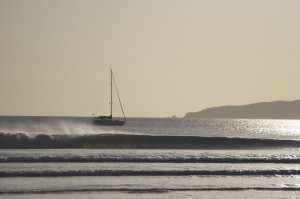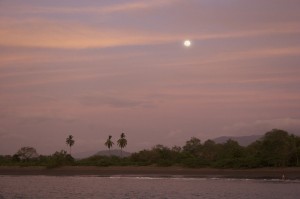Part 1 – Lost in Flow
by Robert McCauley
Life on the boat is different.
Aside from the obvious tasks of sailing and boat maintenance, the day to day personal chores like eating, bathing and taking out the garbage are much more complicated than what we are used to in real-life. Sourcing basic food items like fresh water requires much more advance planning especially if it involves leaving the boat on the dinghy. Because of this you generally try to provision for a week or more each time.
 Accommodating the increased logistics associated with every mundane task slows your thought process down from the real-life ram-jam of modern society. You learn to position key items to where you will need them next like leaving a reasonably clean towel and bottle of fresh water on deck before you surf so you won’t track salt water into the cabin unnecessarily and start down that slippery slide into maritime squalor.
Accommodating the increased logistics associated with every mundane task slows your thought process down from the real-life ram-jam of modern society. You learn to position key items to where you will need them next like leaving a reasonably clean towel and bottle of fresh water on deck before you surf so you won’t track salt water into the cabin unnecessarily and start down that slippery slide into maritime squalor.
You also have to be careful where you leave your stuff- that plastic water bottle, sunscreen or sunglasses will likely be floating around or washed up on a beach for a couple hundred or even thousands of years if they manage blow off the deck and out to sea. Sure you might leave them where they may appear to be fine but when the tide turns and the current pulls the boat around on the anchor- will they still be sheltered from the wind?
In short, being on a boat makes you think. What is great about this is that the decelerated pace of life and immediate consequences of each and every action also let’s you think. It’s very hard to sit down and seriously think something through in real-life. It is not often that you get long periods of time uninterrupted time with the internal processes firing away. On the boat it’s more common than not- especially at night.
When the sun goes down and the moon does its thing a deep and rich silence takes hold. If you are comfortably anchored in a firm bottom and the wind barely blows there is a great stillness complements this silence. As the stars burn away, a profound lack of external stimulation settles in and you know that things will stay just as they are until dawn or later.
Sure there are sounds. There’s the occasional lap of waves against the hull, the light wrap of the snubber and the occasional bounce of the dingy as it melodramatically ricochets against the stern with its Kurt Cobain-esque brand of melancholic self-destruction. These are the usual sounds and there are others too, but they don’t break the silence because they are some how part of it. 
But there is no impeding alarm clock (other than the sun,) no unexpected cell phone ringing and no web-cast or hockey game to ruckus things up. There is what you see and that’s all there is and that is what lets you think like you don’t get to think in real-life…
